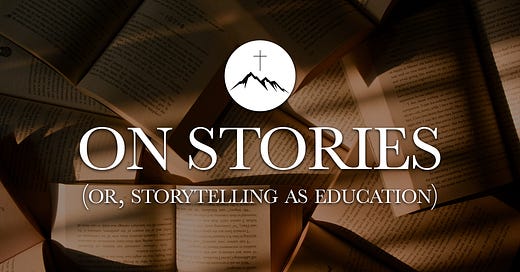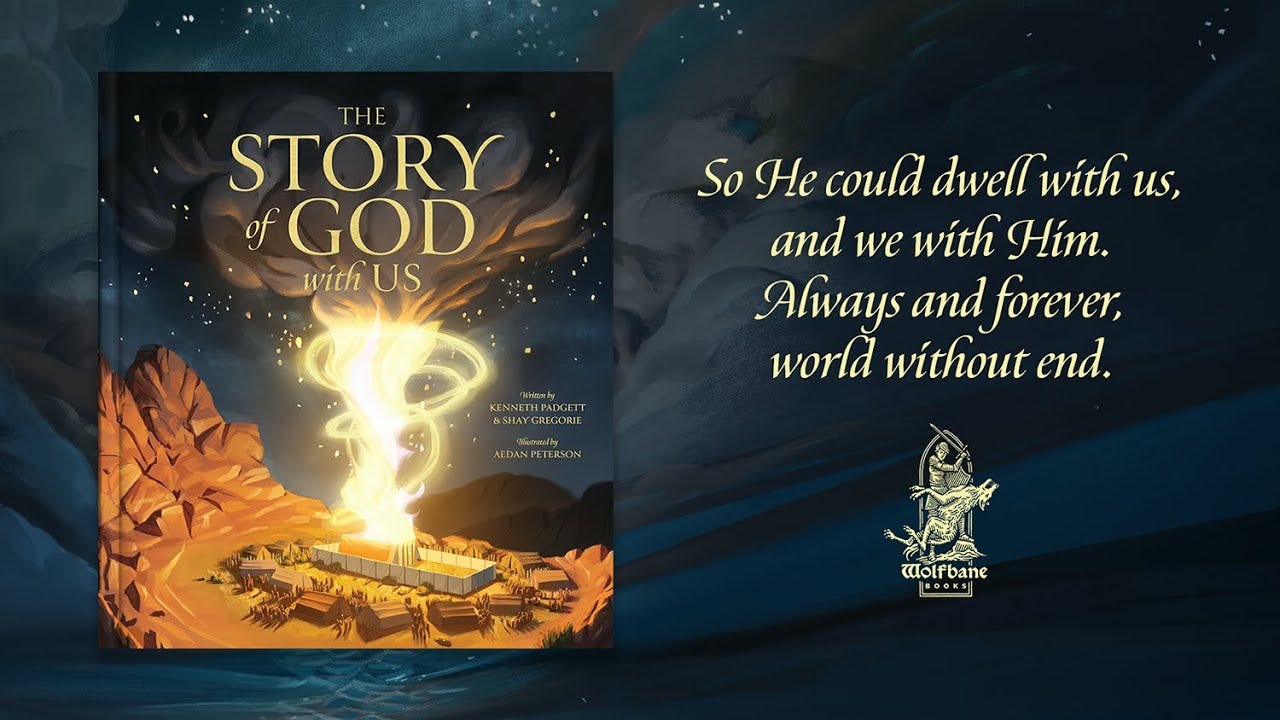On Stories (Or, Storytelling As Education)
"You can never get a cup of tea large enough or a book long enough to suit me."
Why do we tell stories?
That’s not exactly an easy question to answer. It’s one loaded with hundreds, even thousands of years of swashbuckling, giant-slaying, romantic, and adventurous tales following closely behind. From Mary Shelley and William Shakespeare to Ray Bradbury and the unknown author of Beowulf, stories have entertained, thrilled, comforted, convicted, informed, and encouraged us throughout time. This is especially true of us in the West, where the stories told by popular culture reign supreme in the collective consciousness.
But what makes these stories so important? What makes them vital?
At the time of writing this, I spent the first half of my evening listening to an episode of The Storied Outdoors, a podcast that self-describes itself as “somewhere between Lewis and Tolkien and Lewis and Clark.” That description alone had me interested, but it was one of their most recent episodes featuring author S.D. Smith that turned me onto the podcast initially.
Known best for The Green Ember series of novels, Smith is West Virginian born-and-bred and focuses his entire career on crafting compelling stories for families, particularly his own. We had previously been turned onto Smith’s work via The Green Ember books (often promoted as #RabbitsWithSwords) after hearing about them online, and my wife read all four of the main novels1 in the span of a month, maybe two.
Smith is a family man. He originally wrote The Green Ember books for his own children, and his latest novel, Jack Zulu and the Waylander’s Key, was co-authored by him and his teenage son. They plan on more Jack Zulu books in the future. In the interview, Episode 74, Smith speaks very highly of his son and describes their time writing together as a sort of “the best idea wins” partnership, and as Smith expounded on his time writing with his boy (J.C. Smith), I couldn’t help but meditate on what storytelling is really about.
In eons past, storytelling has been an effective way to teach moral lessons or keep a historical record. Oral tradition in particular was perfected by many Native American tribes, who used stories to pass down their tribal history through generations for thousands of years. Other cultures used art as their means of telling stories, be it through pictographs, paintings, pottery, or sculpting.
For centuries, even churches and cathedrals were adorned with altarpieces and stained glass that highlighted the same Old and New Testament tales of God’s faithfulness in spite of man’s depravity. We don’t build houses of worship with storytelling in mind any longer, but maybe we should reconsider.
Stories tell us something about ourselves, about our motives, about our world. They can be reflective, looking back on the hard times of the past with hindsight, or they can be prophetic, anticipating what the future may hold, good or bad.2 They can also make statements about the here and now, statements of criticism or exhalation. No matter who is writing what story, there’s always a meaning or a message behind it. As George Orwell once wrote…
“Every writer, especially every novelist, has a 'message,' whether he admits it or not, and the minutest details of his work are influenced by it. All art is propaganda.” - George Orwell
Orwell is right, of course, whether we’d like him to be or not. Even Aristotle said as C.S. Lewis reinterprets in his lecture-turned-book The Abolition of Man, that “the aim of education is to make the pupil like and dislike what he ought.”3 Storytelling is a form of education, and the movies, shows, books, comics, podcasts, radio programs, musicals, songs, and plays we view and consume will inform us in some way or another as we "grow up."
Like the small bit of "inspiration" planted in Cillian Murphy's character in Inception, the stories we grow up with will carry with us through adulthood, unconsciously shaping the way we view the world. Even Smith admits that Louisa May Alcott’s Little Women (one of my wife’s absolute favorites) was a huge inspiration to him in his youth, and the character of Jo March helped inspire him to pursue writing as a child and then later in life.
Now, I could easily say something here about the political bias in Hollywood’s film industry or New York’s publishing houses, or even about the agendas being pushed by the music industry or the theater. I could talk about how the wrong messages are influencing children and how harmful certain stories can be, but why bother retreading where so many have (often rightfully) gone before? Rather, I’d like to refocus on how Smith describes his own work, “new stories with an old soul.”
In describing The Green Ember series, and by extension his other works, this way, Smith is taking a stance. A Christian, a husband, a father, and a writer, all of these parts of what make up Smith’s identity (though there’s certainly more to him than that, including his West Virginian heritage) inform the types of stories he tells. As they should. And this is where we find the answer, or rather an answer, to our original question.
We tell stories because of who we are and what we’ve been given, or gifted rather, to share.
It’s as simple as that. Or, at least it can be.
Near the end of the podcast, Smith puts his career as a writer into perspective. He talks about loving his family well and loving people well, and how that matters so much more than the “will I be remembered?” question. “Thinking small, thinking modestly is effective for what I wanna see in the world, and sort of receiving it from the hand of God, leaving the results to him…”
For the Christian author, this is what writing should be all about. In fact, for Christians in general, this is what life should be about. Aside from our duty to proclaim the Good News of Jesus Christ and His Kingdom, we’re meant to live simple and peaceful lives while here on Earth.4 That means caring for our families, that means loving those around us (including our enemies), engaging with our communities and culture, serving those in need, honoring God, and doing the best we can with what we're given.
As we tell stories to our children, as we read to them or write for them, let the words we say mean something deeper, something true.
“True education is a kind of never ending story — a matter of continual beginnings, of habitual fresh starts, of persistent newness.” - J.R.R. Tolkien
I don’t believe that the type of “education” that Tolkien describes here is simply academic in nature. It goes far beyond that. Rather, I believe that the scribe behind The Lord of the Rings is describing something not unlike what was commanded to Israel as recorded by Moses in the Book of Deuteronomy.
“Hear, O Israel: The Lord our God, the Lord is one. You shall love the Lord your God with all your heart and with all your soul and with all your might. And these words that I command you today shall be on your heart. You shall teach them diligently to your children, and shall talk of them when you sit in your house, and when you walk by the way, and when you lie down, and when you rise. - Deuteronomy 6:4-7
This type of education lives far beyond lectures and sermons, philosophical discussions and scientific experiments. While there’s a time and a place for all these things, and they’re all crucial on their own, I’m a firm believer that they should play second fiddle to stories. Be they fantastical fairy tales, personal anecdotes, or biblical parables, there is something about storytelling—good storytelling, that is—that can deeply train a child in the way that he or she should go.
Maybe that’s a bit too far for some, but there’s something to be said about the power of a good story. They can change us, shape us, and mold us into people better than we once were. And if they’re good stories,5 they can help grow us into the person that our Heavenly Father threaded us together to be.
“Since it is likely that children will meet cruel enemies, let them at least have heard of brave knights and heroic courage.” - C.S. Lewis
This Week’s Petty Pick
The Story of God With Us by Kenneth Pagett & Shay Gregorie, with immaculate artwork by Aedan Peterson, is the debut novel of Wolfbane Books, a new publishing house somewhat inspired by the works of C.S. Lewis (their name itself is a reference to The Lion, The Witch, and the Wardrobe).
The book is beautiful. That’s honestly the best way to describe it, as it accurately retells the story of the Bible for young children, highlighting God’s love for us throughout the human story. If you have kids or grandkids (or want kids one day), this is a must for your personal library. We love it.
Exile is an indie comic book written by Demon Hunter frontman Ryan Clark about a young girl named Hunter who lives in a post-apocalyptic world where thought and free speech is controlled. The book sort of coincides with the band’s recent album of the same name, which is pretty fun.
This almost Book of Eli-ish series made it on Looper’s “Best Comics of 2022” list (written by yours truly), which earned this writer a shout-out from the band online! Unfortunately, not every issue of this four-part miniseries is out just yet, but the anticipation for the next installment is real.
There are six other stories set within The Green Ember series, though the four main books, consisting of The Green Ember, Ember Falls, Ember Rising, and Ember’s End, cover the majority of it. Two other series, Green Ember: Old Natalia and Green Ember: Archer, follow side characters and further expand on Smith’s anthropomorphic world.
Just go back and read Bradbury’s Fahrenheit 451, which was written in the early 1950s, through the lens of today…
Ironically, The Abolition of Man, which prophecies a dystopian world made by those who would abuse education and history, was recently turned into a comic book made from A.I.-generated artwork. Lewis is no doubt rolling over in his grave, or, rather, sighing deeply from above.
In 1 Thessalonians 4:11, the Apostle Paul admonishes us to “live quietly,” sometimes translated as “live simply.” When writing to Timothy in 1 Timothy 6:6-7, he reinforces the idea that we should be godly and content with our lives. Even Jesus reminds us in Luke 12:15 to be careful not to care too much about worldly possessions. There are, of course, countless other passages in Scripture that remind us of these things, ultimately pointing us Heavenward in our affections, but the point is that status and things are temporary and won’t last. Stories that encourage and produce good character, however, will matter into eternity, even if the stories themselves fade.
What I mean by this is that they’re good by God’s standards and not man’s. This was the theme of my previous essay on “What Makes A Movie Good?,” which I admit was mostly stringing random thoughts together to try to make a point. I’m hoping this piece is a bit more coherent.






